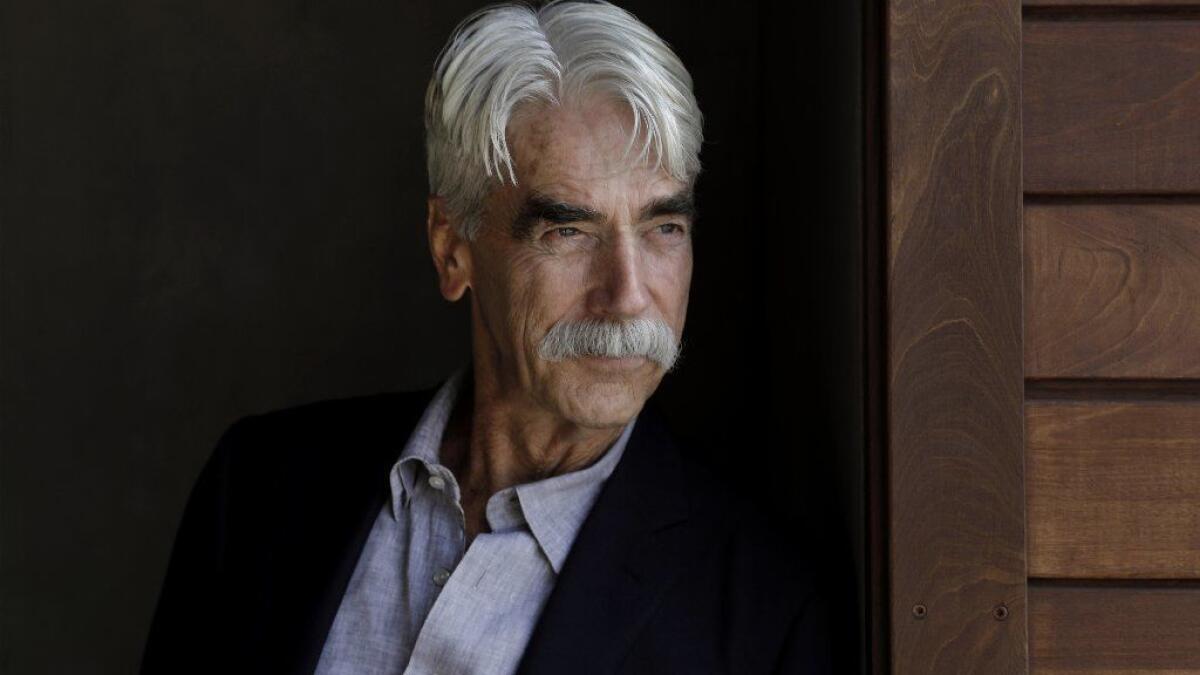‘A Star Is Born’s’ Sam Elliott wrangles trucks, a drug-addict brother and his tightly held emotions

- Share via
About 30 years into his storied film and TV career, Sam Elliott started tiring of playing aloof tough guys. “I just thought, ‘Am I ever going to get out of this?’” he wondered. Then along came his role as a cowboy named the Stranger in the Coen brothers’ 1998 cult comedy “The Big Lebowski.” “I finally came to grips with it,” said Elliott, in his low, dusty voice. “I figured I’d just embrace it.”
In “A Star Is Born,” Bradley Cooper’s three-hankie update on the classic Hollywood love story, Elliott plays Bobby Maine, the white-haired, shaggy-browed manager tasked with forever cleaning up after his much younger half-brother, the doomed gin-guzzling country rocker Jackson Maine (played by Cooper, who also co-wrote, directed and co-edited the film). Lady Gaga – whom Elliott addresses by her birth name, Stephanie – is Ally, the singer-songwriter that Jackson falls for.
Through the many rough cuts of the film, Elliott watched his screen time swell and shrink. In the version Cooper screened for the cast before its premiere at the Toronto International Film Festival, the film was almost all Cooper and Gaga, with the supporting roles whittled far down. But at its Toronto premiere, all of Bobby’s best moments were back. “Are you all right?” Gaga asked him when the lights came up and she found him weeping.
In an interview at Caffe Luxxe in Malibu, he spoke of that moment and working with Gaga, the logistics of acting while driving, as well as how Cooper chose to let him know he wanted him for the film. Turns out Cooper had spent months with a coach, perfecting an approximation of Elliott’s deep, signature rasp in order to play his younger brother. “He played me a tape,” said the 74-year-old. “But first he said, ‘I’ve got something I want you to listen to. You might think it’s kind of weird.’”
So did you ever ask Cooper what would have happened if you said no to the role?
No, I didn’t ask him that. But I’ve heard him talk about it. Basically, what he said was, “I’d have been … if Sam wouldn’t have done the part.” There was never an explanation about who he’d go to next.
Here’s how an admirer describes the power of your performance on Twitter: “How the hell did Sam Elliott just drop one of the best acting moments of the year while backing up a … car?” Let’s discuss the mechanics of that.
The mechanics of it were that it was a hill like this [he holds his hand at a steep angle] and that thing was a monstrosity, that truck. It was a dually, you know, two wheels on both sides in the back. And I only had a little small window [of space] to put that truck in. But I’ve had a lot of experience with vehicles like that. I drive a truck. It’s parked out front right now.
So there was that [quasi-improvised moment when Jackson reveals that he has always idolized Bobby] and everything else floated on that beat. I just sustained it as I watched him get out of the truck. I think [Bobby] wanted out of there. He didn’t want to hang around anymore. I think he knew that Jack was going to go down, that he was on that collision course. That’s part of what really got to me, the profound sadness. They clearly loved each other. But they could never get it together.
Talk about why it made sense that it was Bobby who comforts Ally at the end of the film.
You never saw them together a lot. But it didn’t matter. You had the sense that Bobby was always around. He was like the shadow you saw once in a while on the wall and that was it. Then every so often, he’d come in and say something. We didn’t need to see any more of him than what we saw.
In “Mask” you worked with Cher and now in “Star” with Gaga. What did the first experience teach you about how to approach the second one?
I think working in front of those massive audiences allows [a pop superstar] to be just as comfortable in front of a camera. Cher was that way. It was the same with Stephanie. She was totally unflappable. It was like she’d been doing it forever.
Now that you’ve embraced your image as the wry personification of the Old West, what’s next?
I’m in another thing right now. I’m good with it. But it’s almost not about the acting. It’s about being the guy with The Voice and The Mustache.
I beg to differ. You’re the guy who has seen everything and has perspective. You’re the adult in the room.
That makes me think of a meeting I had for “Road House.” I went and met [producer] Joel Silver at Fox. Rowdy Harrington, the director, was there. Maybe a casting person. And I asked him, “How do I fit into this thing?” and he said, “You’ve got baggage.” I said, “What do you mean?” He said, “Baggage. You’ve been around a long time.”
So that’s what you’re talking about. It’s baggage. I really appreciated it. I thought of that as positive. It says, “You’ve been there.”
More to Read
From the Oscars to the Emmys.
Get the Envelope newsletter for exclusive awards season coverage, behind-the-scenes stories from the Envelope podcast and columnist Glenn Whipp’s must-read analysis.
You may occasionally receive promotional content from the Los Angeles Times.










